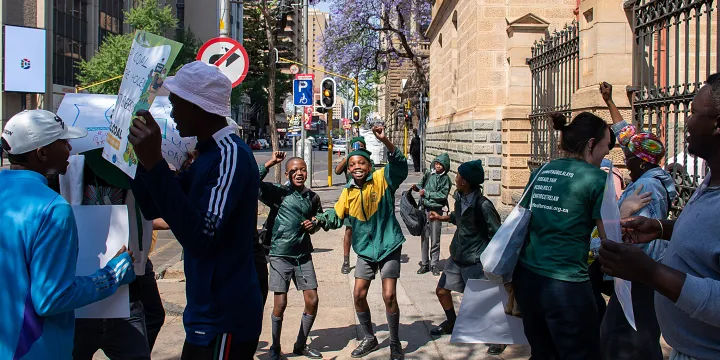Blog
"South African young people are done waiting for decisions to be made without them"

The young people in South Africa have been busy! PhD Researcher and Child Rights Lawyer, Liesl Muller, gives an insightful overview of the 3 child/youth-led climate cases that the South African courts are currently grappling.
It’s been a busy time for young climate activists in South Africa over the past few months. South African children are at COP29 speaking to world leaders about their experiences and demands regarding the climate crisis, while back home the courts have been grappling with child rights in the context of climate change.
Three interesting cases have come before the courts recently. They are informally known as the Cancel Coal; the Deadly Air; and the Children of Kabwe cases. These cases were either brought by children; on their behalf; or in their interest. The law being argued in, and coming out of, these cases will have long-lasting consequences on children’s access to, not only a healthy environment and a liveable climate, but on many of their other rights. In particular, their right to be heard and to participate in matters affecting them.
In early October, the High Court in Pretoria heard the case of the youth led African Climate Alliance and its allies against decision makers in the South African government. African Climate Alliance et. al., v. Minister of Mineral Resources et al, aka the Cancel Coal case, tells the personal story of 8 young people between the ages of 13 and 25 years, detailing the effects of climate change on their daily lives and well-being. The young applicants tell the court that they are not only acting in the interest of children today, but also in the interest of future generations when they argue that the government’s decision to procure 1500MW additional coal-fired electricity is unconstitutional and should be set aside by the court.
In the petitioners claim, Anelisa (fourteen years-old) tells the court: “I feel the effects of climate change every day. I am worried that climate change will result in there being more storms and other natural disasters, which will lead to homelessness or other severe consequences.” Anelisa experienced the severe droughts of 2018 in Cape Town, and her family home has been destroyed more than once by floods caused by heavy rains. Her words illustrate her intimate knowledge of the way in which climate change exacerbates socio-economic issues and causes further inequality. Her and her peers’ testimonies put the court in a position where it can truly understand the context to which their judgment will apply, and to develop the law in line with the South African Constitution’s transformative agenda, giving meaning to its bill of rights.
The Cancel Coal applicants, unlike many other youth-led cases, rely heavily on child rights law. Particularly, the right to have their best interests be considered paramount in every matter concerning the child. To give effect to this right, the government would have had to obtain the views of children, and given them due weight, of which they had no proof. In line with a new trend in these youth-led cases, the young people rely on their right to equality, saying that being made to bear the brunt of climate change impacts is a form of discrimination based on age. Judgment was reserved. Watch this space for updates!
The decision in the Deadly Air case was heard on appeal in September and the Children of Kabwe is on its way to an appeal hearing. These cases grapple with the special duty on courts and government to take proactive steps to protect children’s rights; and the standard to be applied in procedural issues where children are represented in a class suit.
The Centre for Child Law at the University of Pretoria has joined or will be joining all three of these cases. Their submissions provide the courts with expert legal opinion on the application of a child rights-based approach and the application of unclear concepts like intergenerational justice and future generations by providing legal comparison in foreign and international law. Their research was made much easier with the help of our very own Youth Climate Justice case law database. This database provides a summary and breakdown of child/youth climate cases around the globe, using a children’s rights-based analysis. The climate case breakdowns identify and cover the relevant articles of the United Nations Convention on the Rights of the Child (UNCRC); the mention/involvement of intergeneration equity and future generations; how the children/young people were involved and which NGOs supported, if any; and the outcome of the decision and how it impacted development of the law.
Find out more about the young activists taking government to court over coal plans here. You can also read about more young South African climate leaders activists who are leading the way on behalf of all of us.
*The heading of this blog post is a quotation by African Climate Alliance activist Gabriel Klaasen, found in “‘Not without a fight’ — young activists take Mantashe, Nersa to high court over new coal power plans” by Julia Evans.

